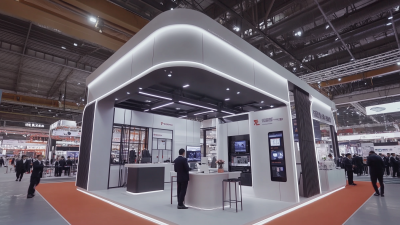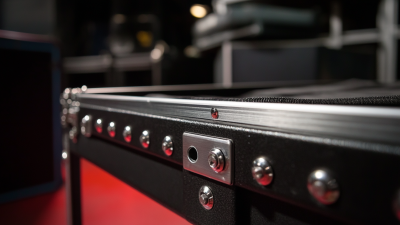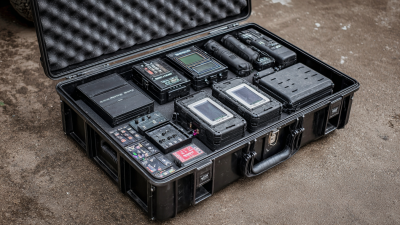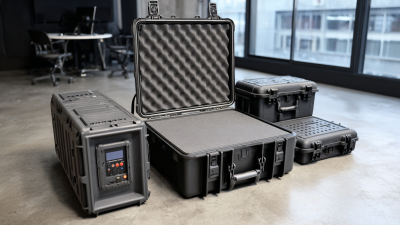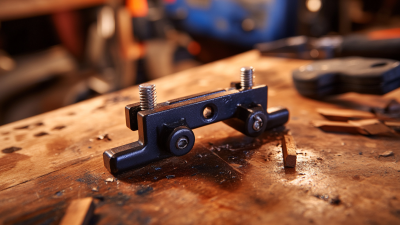Leave Your Message
In today’s dynamic business landscape, choosing the right Road Case Hardware is crucial for ensuring the durability and functionality of essential equipment, particularly in the live event and transportation industries. According to a recent report by MarketsandMarkets, the global road case market is projected to grow from $2.1 billion in 2021 to $3.0 billion by 2026, reflecting a compound annual growth rate (CAGR) of 7.4%. This growth can be attributed to an increasing demand for robust and portable solutions that protect valuable gear from damage during transit. As businesses of all sizes seek to optimize their operational efficiency and safeguard their investments, understanding the various types of hardware available is essential. Selecting the best Road Case Hardware not only preserves the integrity of instruments and equipment but also enhances logistical processes, positioning companies for success in a competitive marketplace.

 When it comes to transporting valuable equipment, investing in high-quality road case hardware is crucial for ensuring protection and durability. The right hardware not only safeguards the contents from physical damage during transit but also extends the overall lifespan of your road cases.
When it comes to transporting valuable equipment, investing in high-quality road case hardware is crucial for ensuring protection and durability. The right hardware not only safeguards the contents from physical damage during transit but also extends the overall lifespan of your road cases.
Tip: Consider investing in marine-grade hardware, especially if your cases will be exposed to harsh environments. This type of hardware is designed to withstand moisture and corrosion, making it suitable for outdoor events or humid climates.
Additionally, prioritizing weight distribution in your hardware selection can significantly influence ease of transport. Lightweight yet sturdy materials can reduce the strain of moving heavy cases while maintaining their structural integrity.
Tip: Look for ergonomic handles and wheels designed for smooth rolling, facilitating effortless maneuverability without compromising on protection. Higher-quality hardware may come at a premium, but the long-term benefits of enhanced durability will provide peace of mind for your business.
When selecting road case hardware, the choice of materials is crucial for ensuring durability and performance for your business. Aluminum, plastic, and composite materials each offer unique advantages. Aluminum, known for its strength and lightweight properties, is often preferred for cases that require high structural integrity while remaining easy to transport. It is particularly beneficial in environments where exposure to different conditions is a concern, as it resists corrosion and wear.
On the other hand, plastic options provide a more cost-effective solution and are often favored for their flexibility and lightweight nature. Recent advancements in recycling technology have led to the emergence of innovative composite materials derived from recycled plastics. These materials not only contribute to environmental sustainability but also promise enhanced performance through improved durability and resistance to impact. As businesses increasingly prioritize eco-friendly practices, exploring composite materials can be an intelligent investment. Evaluating the long-term implications of material choice will ultimately lead to better sustainability and efficiency in road case manufacturing.
When it comes to selecting road case hardware, understanding your
customization needs is crucial to effectively protect your valuable equipment.
Different professions require unique solutions; for instance,
musicians transporting instruments may need specialized foam inserts to prevent movement during transit, while
audio-visual technicians might focus on modular designs to accommodate various gear setups.
By assessing the specific equipment you intend to carry and the
nature of its use, you can tailor your road case to enhance both usability and security.
Customization also extends to
size and shape considerations.
It's essential to measure your equipment accurately and consider future upgrades or changes in your gear.
Opting for adjustable dividers or removable trays can provide flexibility in organizing different pieces of equipment efficiently. Moreover, incorporating
durable materials and features such as weatherproof seals or reinforced corners ensures that your customized road case withstands the rigors of travel while keeping your gear safe.
Ultimately, a well-tailored road case not only protects your investments but also
streamlines your workflow, allowing you to focus on what truly matters—delivering outstanding performances and services.
When selecting road case hardware, weight and portability are crucial factors that significantly influence transportation efficiency. Lightweight materials not only reduce the overall weight of the cases but also minimize shipping costs and handling difficulties. According to a recent study, effective weight management can lead to a cost reduction of up to 15% in transportation expenses, making it essential for businesses to consider their hardware choices carefully.
Furthermore, the portability of road case hardware directly impacts operational efficiency. The convenience of handling and mobility allows for quicker setup and teardown times, which is vital in fast-paced environments. Data suggests that investing in portable hardware can enhance workflow and increase productivity metrics by approximately 20%. As industries globally adapt to new energy storage technologies, optimizing hardware for transportation is increasingly relevant; businesses must ensure that their investments in hardware align with their logistical needs and sustainable practices.
| Hardware Type | Weight (lbs) | Portability Rating (1-5) | Durability Rating (1-5) | Cost ($) |
|---|---|---|---|---|
| LATCHES | 2.5 | 4 | 5 | 15 |
| HANDLE | 1.2 | 5 | 4 | 10 |
| WHEELS | 5.0 | 3 | 5 | 50 |
| LOCKS | 2.0 | 4 | 4 | 20 |
| HINGES | 3.5 | 4 | 5 | 25 |
When selecting road case hardware, businesses often face the challenge of balancing quality with budget constraints. According to a recent report by IBISWorld, the road case manufacturing industry is projected to grow at an annual rate of 4.1% over the next five years, reflecting a rising demand for durable and cost-effective solutions. This growth is driven by increased usage in various sectors, including live events, film, and broadcasting, where equipment protection is paramount.
Investing in high-quality road case hardware can yield significant returns. A study by the International Association of Exhibitions and Events (IAEE) indicates that businesses that prioritize equipment longevity and reliability can reduce replacement costs by up to 30%. Moreover, selecting hardware that meets rigorous industry standards ensures not only the safety of transported goods but also enhances the overall brand reputation. For companies operating on tighter budgets, it is crucial to evaluate the total cost of ownership rather than just the upfront expense—considering factors such as maintenance, repair frequency, and potential loss of equipment can provide a clearer picture of long-term savings and value.

